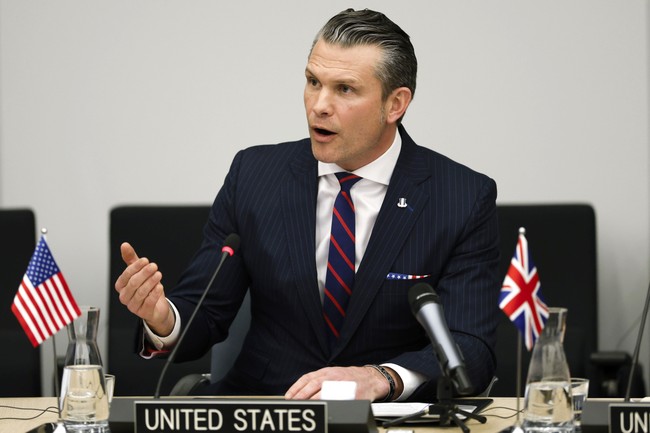
While speaking to the United States NATO allies in Belgium on Wednesday, Secretary of Defense Pete Hegseth reiterated President Trump’s desire to bring an end to the Russian/Ukrainian conflict – but also warned that a return to Ukraine’s pre-2014 borders was an “unrealistic objective.”
Advertisement
Hegseth, speaking to the Ukraine Defense Contact Group in Belgium, also said “stark strategic realities prevent the United States from being primarily focused on the security of Europe” because the U.S. is focusing on “securing our own borders” and “deterring war with China in the Pacific.”
“President Trump has been clear with the American people — and with many of your leaders — that stopping the fighting and reaching an enduring peace is a top priority,” Hegseth said about Ukraine, noting that the war is approaching its third anniversary.
“He intends to end this war by diplomacy and bringing both Russia and Ukraine to the table. And the U.S. Department of Defense will help achieve this goal,” Hegseth continued. “We want a sovereign and prosperous Ukraine. But we must start by recognizing that returning to Ukraine’s pre-2014 borders is an unrealistic objective. Chasing this illusionary goal will only prolong the war and cause more suffering.”
The pre-2014 borders of Ukraine, of course, included the Crimean Peninsula. That’s where the big Black Sea port at Sevastopol lies, which gives Russia a major warm-water port with access to the Mediterranean. In the Soviet era, Crimea was originally set up as the Crimean Autonomous Soviet Socialist Republic, and after World War 2, when the area was occupied by Germany, it was folded into the Ukrainian Soviet Socialist Republic. When the Soviet Union collapsed and Ukraine gained independence, Russia lost this major Black Sea port.
Advertisement
It’s unlikely Russia under Tsar Vladimir I will be willing to give that port back now.
In early 2014, Russia first invaded Ukraine’s Crimean Peninsula before annexing the region. Russian President Vladimir Putin then launched a larger military conflict with Ukraine in 2022, which remains ongoing.
“A durable peace for Ukraine must include robust security guarantees to ensure that the war will not begin again,” Hegseth said Wednesday. “The United States does not believe that NATO membership for Ukraine is a realistic outcome of a negotiated settlement. Instead, any security guarantee must be backed by capable European and non-European troops.”
“If these troops are deployed as peacekeepers to Ukraine at any point, they should be deployed as part of a non-NATO mission and not covered under Article 5. There also must be robust international oversight of the line of contact,” he continued. “To be clear, as part of any security guarantee, there will not be U.S. troops deployed to Ukraine.”
The lack of coverage under Article 5 of the NATO charter implies that should Russia resume hostilities in Ukraine, NATO would not be dragged into a larger conflict.
See Related: SecDef Hegseth Gets a Rude and Disrespectful Welcome by US Military Command in Germany
The United States has, to date, dropped billions in American taxpayer money into Ukraine, and much of that money is unaccounted for. President Trump has indicated that part of the deal for American help in negotiating an end to the conflict may include exclusive American access to Ukrainian rare-earth metals. We should expect Russia to resist that idea.
Advertisement
After all that has transpired, it’s difficult to see a cheap or easy end to the conflict. Ukraine is in the unfortunate position of being on the way to everywhere in Eastern Europe, as well as being historically a territory that has been swapped back and forth since Roman times. Add some considerable natural resources, ample arable land, and a big, declining but still powerful neighbor (Russia), and you’ve got a recipe for conflict. The United States may be able to facilitate a ceasefire in the current conflict, but Ukraine will almost certainly continue to be a contested territory for generations to come. And, for the time being, Russia won’t be surrendering that Black Sea port.

